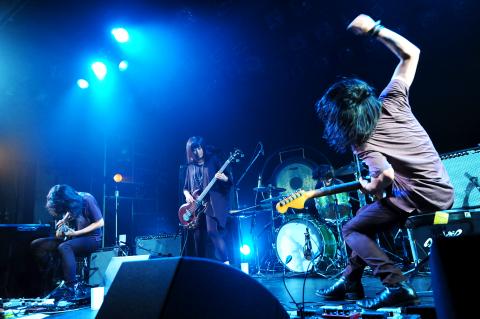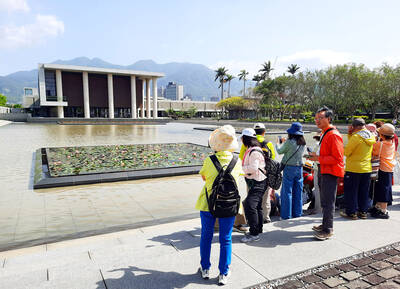“And if you gaze long enough into an abyss, the abyss will gaze back into you.” Nietzsche wrote that in Beyond Good and Evil, and say what you will about the man, he was on to something there. Not a Nietzsche fan? Lamb of God front man Randy Blythe put it another way when he said, “When I write, I have to be able to go to that darker place. I don’t have trouble getting there; the problem is not staying there.” It’s a conundrum artists and introspective types from all circles have wrestled with since humankind first had the intellectual capacity and the free time to look inward. And it’s one that has swallowed many an artist whole.
Tokyo instrumental heavy rock band Mono dove headlong into the darkness in order to put out two companion albums this month, entitled The Last Dawn and Rays of Darkness respectively. For a decade and a half guitarist Takaakira Goto and the rest of the band have been exploring the interplay of light and darkness, or as their bio puts it appropriately, “bliss and bludgeon,” but never has their swirling mass of feedback and effects-drenched wall of guitars come out sounding so raw as it does on the bleaker half of this gargantuan effort. Without pain there can be no pleasure. Without darkness there can be no light. But that doesn’t make delving into the black corners of the mind any easier, says Goto.
“When I actually started writing based on the dark emotions, my daily life started to become much darker and depressing. For example, even when I got out of the studio, my feelings were very rebellious without any thoughts, almost as though I had sold my soul to hell. I thought it was going to be impossible,” he told the Taipei Times.

Photo Courtesy of Teppei.
Goto doesn’t go into detail about what inspired the impossibly black portion of the pairing, saying only that he was “in a bad place” when he wrote those songs that would appear on Rays of Darkness. However, just over a year ago, songs of a very different nature began to take shape.
“Last summer, we had the opportunity to work for films and TV shows, so at the same time, not necessarily for MONO but I started to compose more songs in a very different style. I started to change my lifestyle as well, like I almost always composed songs at late nights, but started writing early in the mornings or in the afternoon instead. Eventually, these new songs started to become like medicine for myself, just to live through everyday life.”
It might seem strange to describe a sound as massive as Mono’s as “stripped down,” but this time around the band actually left something that had become something of a trademark off the table. That was the orchestral elements that had previously added a grandiose element of drama. On Rays of Darkness, though, there are none to be found.
“I originally wanted to create something symphonic and spiritual, like Beethoven but with electric guitars,” says Goto. “So far, we managed to experience so many things, more than any indie band can ask for, like playing with full orchestra in New York, London, Australia and Tokyo. From these experiences, we tried something more complex and classical for our previous album, For My Parents, but at the same time, we started to raise some concerns. During the album’s American tour, we started to feel our sounds were like a spineless dinosaur comparing to our old sounds. Sure, symphonic music is loud, epic and dreamy, but there is something lacking compare to rock music, like the pressure and destruction they can bring.”
And so the decision was made to bring back the rawness in a big way, so much so that certain passages take on the feel of Scandinavian black metal, and in fact Goto says all of the members of Mono used to play in a black metal band “back in the day.” In taking things so far in that direction, Goto was nearly consumed. With hindsight, however, the album has become something he can look upon as a stepping stone rather than merely as a bookmark for a particularly dark chapter of his life.
“When I was writing Rays of Darkness, my heart felt like it was getting torn apart. But surprisingly, I enjoy listening to the album now.”
If there is a unifying message or theme within these albums, it is that whenever darkness comes into our lives, and it will, we have only but to walk through it. There is something better on the other side.
“The darkest place is near the end of the tunnel. Don’t give up and keep walking towards the light. You might not notice then but the darkness is there for you to be stronger and to get to the higher place. I wanted to show that and give people hope.”
■ Mono plays tonight at The Wall (這牆), 200, Roosevelt Rd Sec 4, Taipei City (台北市羅斯福路四段200號B1). Tickets are NT$1,300 in advance, NT$1,500 at the door. Doors open at 7pm and the show gets underway at 8pm.

When the South Vietnamese capital of Saigon fell to the North Vietnamese forces 50 years ago this week, it prompted a mass exodus of some 2 million people — hundreds of thousands fleeing perilously on small boats across open water to escape the communist regime. Many ultimately settled in Southern California’s Orange County in an area now known as “Little Saigon,” not far from Marine Corps Base Camp Pendleton, where the first refugees were airlifted upon reaching the US. The diaspora now also has significant populations in Virginia, Texas and Washington state, as well as in countries including France and Australia.

On April 17, Chinese Nationalist Party (KMT) Chairman Eric Chu (朱立倫) launched a bold campaign to revive and revitalize the KMT base by calling for an impromptu rally at the Taipei prosecutor’s offices to protest recent arrests of KMT recall campaigners over allegations of forgery and fraud involving signatures of dead voters. The protest had no time to apply for permits and was illegal, but that played into the sense of opposition grievance at alleged weaponization of the judiciary by the Democratic Progressive Party (DPP) to “annihilate” the opposition parties. Blamed for faltering recall campaigns and faced with a KMT chair

Article 2 of the Additional Articles of the Constitution of the Republic of China (中華民國憲法增修條文) stipulates that upon a vote of no confidence in the premier, the president can dissolve the legislature within 10 days. If the legislature is dissolved, a new legislative election must be held within 60 days, and the legislators’ terms will then be reckoned from that election. Two weeks ago Taipei Mayor Chiang Wan-an (蔣萬安) of the Chinese Nationalist Party (KMT) proposed that the legislature hold a vote of no confidence in the premier and dare the president to dissolve the legislature. The legislature is currently controlled

Dull functional structures dominate Taiwan’s cityscapes. But that’s slowly changing, thanks to talented architects and patrons with deep pockets. Since the start of the 21st century, the country has gained several alluring landmark buildings, including the two described below. NUNG CHAN MONASTERY Dharma Drum Mountain (法鼓山, DDM) is one of Taiwan’s most prominent religious organizations. Under the leadership of Buddhist Master Sheng Yen (聖嚴), who died in 2009, it developed into an international Buddhist foundation active in the spiritual, cultural and educational spheres. Since 2005, DDM’s principal base has been its sprawling hillside complex in New Taipei City’s Jinshan District (金山). But